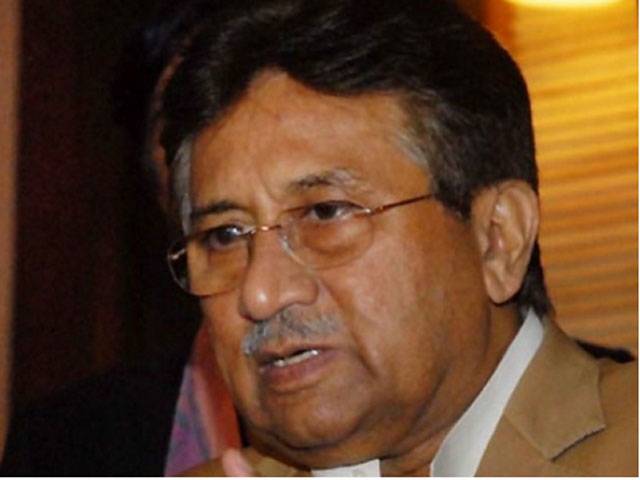ISLAMABAD - The Special Court, set up under Criminal Law Amendment Act 1976, has an exclusive jurisdiction for the trial of former president Pervez Musharraf as high treason is a constitutional offence and punishable under High Treason (Punishment) Act 1973.
Public Prosecutor Akram Sheikh argued before a three-judge Special Court headed by Justice Faisal Arab and comprising Justice Tahira Safdar and Justice Yawar Ali Khan. He said the Special Court cannot be treated as an ‘ordinary court of criminal justice in Pakistan’.
He said the accused Gen (Retd) Pervez Musharraf can neither be restored to his ranks for the purpose of his court martial under Section 7 of Pakistan Army Act (PAA), 1952, nor the said Act permits the court martial of Chief of Army Staff (COAS) as under Section 81 of the PAA such order should be issued by the army chief. “The Special Court has no jurisdiction to direct the federal government to restore Pervez Musharraf to his previous ranks because it shall be contrary to the law and constitution,” he added.
The prosecutor contended that the high treason offence was first time included in 1973 Constitution due to the history of Pakistan. The words ‘high treason’ are not mentioned in 1956 and 1962 Constitutions and also in the Pakistan Army Act 1952. The high treason offence could not stand juxtaposition with the court martial and the Special Court.
He said since the amendment, brought about by Act X of 1977, in PAA 1952 were no longer on statute books and there was no deeming clause whereby civilians could be tried under the Pakistan Army Act 1952 therefore on 10th November 2007 the Pakistan Army (Amendment) Ordinance 2007 was promulgated. But the Ordinance excluded the High Treason (Punishment) Act 197.
Sheikh contended that the legislative intent is manifest that for high treason offence only Special Court is the competent forum for any person whether he is civilian or armed personnel. He informed the court that the Islamabad High Court (IHC) had already dismissed Musharraf petition mentioning the same ground on 23rd December 2013. However the defence team did not mention it in their applications submitted before this court, and thus misled the court.
The IHC had ruled: “The contention is not correct for the reason that the petitioner is being tried for the offence Under Article 6 of the Constitution of the Islamic Republic of Pakistan, though the procedure is provided under the Criminal Law Amendment (Special Court) Act. Since, the Constitution has overriding effect over all the other laws including the Pakistan Army Act, the prayer that the petitioner be tried under the Army Act is not correct. Finding no force in this petition, the same is hereby dismissed in limine.” He said that the courts martial, established under Section 80 of the PAA, are barred from holding Musharraf trial in the instant matter on account of Sections 91(1) and 92(2) of the said Act.
The sections 91(1) of the Pakistan Army Act, 1952, states: “No trial by court martial of any person subject to this Act for any offence, other than an offence of desertion or fraudulent enrolment or any of the offences mentioned in section 31 or section 40 or section 59, shall be commenced after the expiration of three years from the date of such offence...”
Whereas Sections 92 (2) of Army Act, 1952, states, “No such person shall be tried for an offence unless his trial commences within six months after he had ceased to be subject to this Act.”
Akram Sheikh pointed out in the present case more than five years have passed since Pervez Musharraf had ceased to subject to the PAA, 1952. The prosecutor further contended that Section 549 of Code of Criminal Procedure was also not applicable to the case as it is inconsistent with Section 3(2) of the Criminal Law Amendment (Special Court) Act, 1976 which says; “No court other than the Special Court shall try an offence which is triable by the Special Court under sub-section (1).” He said section 549 only applies when a person subject to military law is bought before it, while in this case the accused (Musharraf) is not subject to military law.
Akram Sheikh has concluded his argument. The court on the request of Dr Khalid Ranjha adjourned the hearing on whether Musharraf be tried under PAA till February 18, the day when former army General had been asked to appear before the court.
Tuesday, October 22, 2024
‘Mush can’t be returned uniform for military trial’

Caption: ‘Mush can’t be returned uniform for military trial’
12:14 PM | October 20, 2024
Pakistan likely to make one change for third test against England in Rawalpindi
4:50 PM | October 22, 2024
PSX maintains bullish momentum after 26th Constitutional Amendment
4:49 PM | October 22, 2024
BNP-Mengal’s senator Qasim Ronjho resigns from Senate
4:47 PM | October 22, 2024
Meta's Israel policy chief sought to censor pro-Palestinian Instagram posts
3:50 PM | October 22, 2024
PM hails 26th Amendment as key to Pakistan's development and justice reform
3:20 PM | October 22, 2024
-
CJP Qazi Faez Isa begins chamber work ahead of retirement
-
CJP Qazi Faez Isa begins chamber work ahead of retirement
-
Pakistani students join Chinese martial arts training camp in Shanxi
-
PTI to boycott voting for constitutional amendments
-
Multan Victory: Will Critics Finally Reflect On Their Unfair Blame Of Mohsin Naqvi?
-
Pakistan ends 15-month winless streak with commanding victory against England in Multan Test
Kashmiri Resistance
October 22, 2024
Anti-Smog Initiatives
October 22, 2024
New Realities
October 22, 2024
Another Jadhav
October 21, 2024
Judiciary Revamped
October 21, 2024
Livestock Sector in Shambles
October 22, 2024
Women’s Suffering
October 22, 2024
Impact of AI
October 22, 2024
The State’s War on Activism
October 22, 2024
Toxic Air
October 22, 2024
ePaper - Nawaiwaqt
Nawaiwaqt Group | Copyright © 2024





